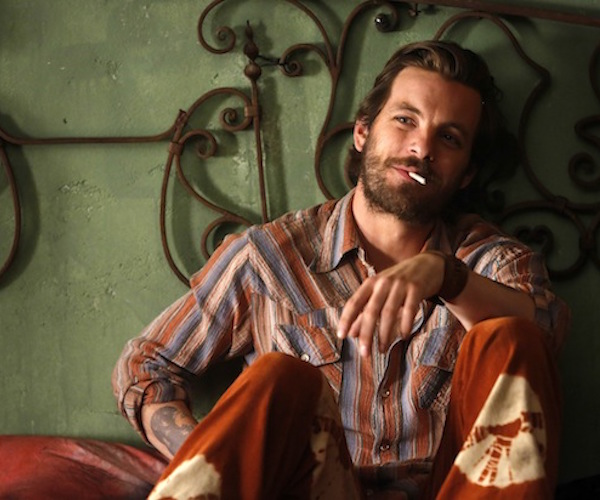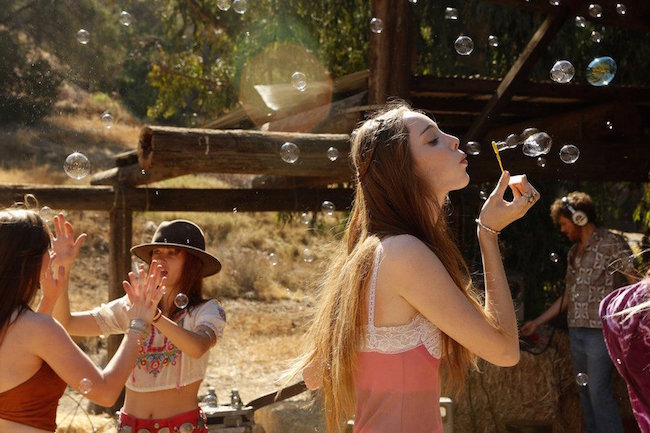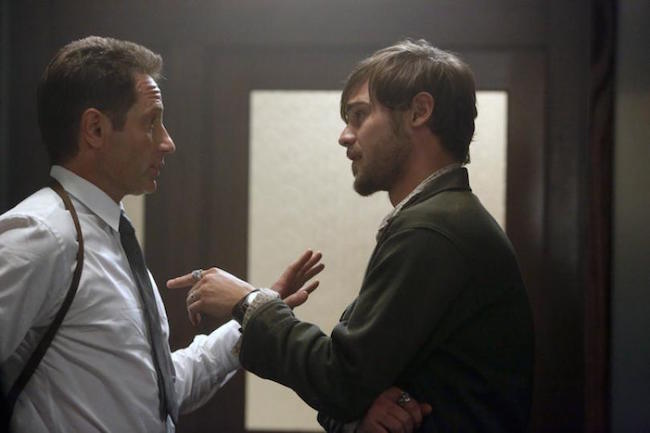TV Column “Watch Closely” — Charlie Manson is My Boyfriend
If you really want a full-on immersion into the halcyon decade that that gave us the Beatles, bellbottoms, Jefferson Airplane, lovebeads, Vietnam, the Black Panthers and free love, you simply must watch Aquarius.

Gethin Anthony (aka MY BOYFRIEND) as Charlie Manson in “Aquarius.” Photo: (Vivian Zink/NBC)
By Peg Aloi
Welcome to my new television column, Watch Closely. I hope you’ll join me on a (mostly) weekly basis as I discuss shows I’m watching that I think you oughta be watching, and maybe sharing/dissecting an occasional news tidbit.
There’s so much good stuff on television these days that it’s no exaggeration to call it a Golden Age. Is anything more satisfying than settling into the couch with a new boxed DVD set (or a series queued up on Netflix for binging) and some drinks and snacks? Nope. This is the new cinema experience. The theatres have all mostly gone digital, anyway, except a few holdouts in Boston. By the way, do catch the excellent documentary The Dying of the Light this week at the Somerville Theatre (Fuse review), and see what we are losing as the art of film projection slowly fades from view.
Not only is television increasingly cinematic these days, but we’re seeing more period settings: as with Turn, AMC’s excellent drama set in Long Island, NY during the Revolutionary War, with a fabulous Brit-studded cast including Jamie Bell, Angus McFadyen and MY BOYFRIEND Daniel Henshall. (NOTE: Every week, my column will dutifully inform you of who MY BOYFRIEND is, currently; this week there happens to be two, but one of them may be on his way out.)
Why are period settings trending? Shall we thank Mad Men (and before that, Deadwood)? Game of Thrones, Downton Abbey, Hell on Wheels, heck, I could rattle off a dozen more. My theory is that contemporary settings have somewhat limited appeal because, let’s face it, unless the storyline concerns a cult (like Big Love or The Unbreakable Kimmy Schmidt) or animals (like Wilfred) or old time carnies (like Carnivále or American Horror Story: Freakshow) or a bunch of Luddites (hey, there’s an idea), everyone’s constantly on a smartphone or a tablet and that’s dull as dishwater to watch. Drama is about face-to-face interaction. Expect to see many more period pieces in the pipeline (including Jenji Kohan’s series about the Salem witch trials, which I’m very excited about).
Perhaps because it was set in the world of advertising, Mad Men was a wonderland of period design. Fans could revel in the vintage costumes, music, cars, food and social mores; even the dialogue and acting styles were scrupulously authentic. The 1960s were full of change and upheaval, and the show charted the Civil Rights and women’s liberation movements even as it followed individual characters’ journeys within them. As the show moved closer to the Summer of Love, it was hard to find fault with its psychedelic and hippie iconography. When other television shows have tried to exploit this era, like Swingtown, they’ve erred on the side of the bland and obvious: top 40 music, stereotypical fashions, silly idioms. Masters of Sex (about Masters and Johnson, whose column I used to read in my mom’s issues of Redbook) and The Astronaut Wives Club show a little more promise; and there’s a Swinging Sixties vibe in PBS’ Call the Midwife.

Emma Dumont as Cherry Pop in “Aquarius.” Photo: (Vivian Zink/NBC)
But if you really want a full-on immersion into the halcyon decade that that gave us the Beatles, bellbottoms, Jefferson Airplane, lovebeads, Vietnam, the Black Panthers and free love, you simply must watch Aquarius, NBC’s intense adult drama (which had its second season premiere on Thursday, June 16). Writer-producer John McNamara (whose career bookends Lois & Clark: The New Adventures of Superman in 1993 with this year’s Trumbo, and very little in between) frames a crafty take on one of the most infamous crimes of the 20th century: the Manson Family Slayings.
The pilot begins in 1967, with a search for a missing teenage girl that brings a middle-aged detective named Sam Hodiak (David Duchovny) into the hippie streets of Los Angeles. His partner Brian Shafe (Grey Damon) is a volatile younger detective who Hodiak pulls undercover in order to help him navigate a world of young people who don’t trust cops or people over 30. The missing girl, Emma Karn (Emma Dumont), is the daughter of a prominent local politician. He has a secret taste for rough trade; his wife (Emma’s mother) is an ex-flame of Hodiak’s. Emma was singled out at a party by a charming musician; one of his sexy hippie girlfriends seduced Emma’s escort. Right away, we see that Charlie Manson (played by MY BOYFRIEND Gethin Anthony, who is white hot in this role) is adept at getting what he wants — and he wants Emma, who he christens “Cherry Pop.” She starts living at his commune, which seems to be a constant party scene: sex, drugs, rock and roll, and a fair amount of proselytizing from Manson about how he intends to change the world with his music.
Yeah, so, one of the most famous criminals of all time, leader of a horrific death cult, was really just a misunderstood folksinger. And a bisexual lothario. And a pimp to LA’s politicos. And a convicted thief, thug, and rapist. But damn, is he cute! The show tries to spin for us not only a complex set of characters and scenarios that might have occurred, but also paints a picture of what it must have been like for the young women sucked into Manson’s orbit, desperate for his love and attention, yet impervious to his mood swings and abuse.

David Duchovny and Grey Damon as Sam Hodiak and Brian Shafe in “Aquarius.” Photo: (Vivian Zink/NBC)
Duchovny and Gethin’s characters get just about equal billing in the first season, and even as we see Manson devolve into a power-hungry sociopathic reprobate, we see Hodiak struggle with the changing culture, and the racial and gender tensions in the police department. One young female officer (Whitney Rose Pynn) is also brought in on the undercover operation, a lamb to slaughter situation that spotlights how crudely sexist the whole Free Love movement really was. Aquarius deftly weaves in stories of high-powered politicians who partake of Manson’s stable of young easy flesh, and who also end up manipulated by him in increasingly brutal ways.
The first season gives sly hints at the horrors that await. One of Charlie’s concubines is seen reading Ira Levin’s Rosemary’s Baby, a foreshadowing of Sharon Tate’s murder just after husband Roman Polanski’s film version of the novel was released in 1968. The show’s production design is deliciously intricate, showcasing the stark difference between “establishment” characters and the wild, colorful hippie counterculture. There’s a notable visual fetish for vinyl records. The music is abundant and brilliantly chosen: there’s even one scene that echoes one of Mad Men’s most iconic music moments, when the popular-at-the-time-but-obscure-ever-since song “Found Love” (heard during the famous hashish scene when Don Draper winds up in the pool) is played in a burlesque palace.
Access to the series on streaming services has been spotty at best; Hulu had it for a while, but when the second half of the first season became available, the first half went away. So I recommend getting the DVD set, which has some fun extras (the webisodes are documentary style snippets giving some backstory to the girls), and uncensored dialogue and sex scenes. Fair warning: it’s very juicy and very violent, and women are brutalized in just about every episode. Which is why I think I am gonna have to break up with MY BOYFRIEND Charlie Manson soon. Guy is just too damn moody.
Peg Aloi is a former film critic for The Boston Phoenix. She has taught film studies for a number of years at Emerson College and is currently teaching media studies at SUNY New Paltz. Her reviews have appeared in Art New England and Cinefantastique Online, and she writes a media blog for Patheos.com called The Witching Hour.
Tagged: "Watch Closely", Aquarius, Charles Manson, Gethin Anthony, John McNamara, NBC
